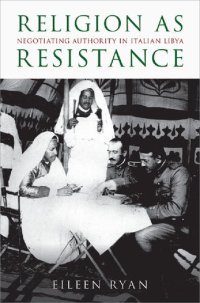
Ebook: Religion as Resistance: Negotiating Authority in Italian Libya
Author: Eileen Ryan
- Tags: Religion Resistance Italian colonialism imperialism Sanusiyya Libya Sufism Islam national identity fascism resistance collaboration Politics
- Year: 2018
- Publisher: Oxford University Press
- Language: English
- pdf
During the Italian occupation of Libya, debates over where Italy should be on the continuum between coercion and collaboration in colonial rule often reflected contentious battles over religious identity in Italian nationalism. These tensions came into sharpest relief in the Italian attempts to develop a power-sharing relationship with elite members of the Muslim Sufi order, the Sanusiyya in eastern Libya.
Perceptions of the Sanusiyya as religious fundamentalists suggested to some the utility of emphasizing a shared sense of religious conservatism to “sell” Italian colonial rule. Others, however, argued that only a secular identity in colonial rule would prevent Muslim opposition to Italian occupation. Descriptions of the Sanusiyya in Italian sources therefore reflected their authors’ conflicting interests in projecting a Catholic or secular identity in Italian expansion. Adherents of the Sanusiyya were likewise divided in their responses to Italian colonial rule. In the early stages of the Italian occupation, Sanusi elites recognized the utility of negotiating a position of political authority in relationship to the Italian colonial state. As the fascist regime pushed colonial rule further toward coercion than collaboration (and embraced a Catholic identity in the process) in the 1920s, some Sanusi factions redefined the Sufi order as a force of anticolonial opposition and a nascent nationalist movement. This book explores the shifting relationship between religious and national identity through the process of negotiating colonial rule among both Italian imperialists and Sanusi elites.
Perceptions of the Sanusiyya as religious fundamentalists suggested to some the utility of emphasizing a shared sense of religious conservatism to “sell” Italian colonial rule. Others, however, argued that only a secular identity in colonial rule would prevent Muslim opposition to Italian occupation. Descriptions of the Sanusiyya in Italian sources therefore reflected their authors’ conflicting interests in projecting a Catholic or secular identity in Italian expansion. Adherents of the Sanusiyya were likewise divided in their responses to Italian colonial rule. In the early stages of the Italian occupation, Sanusi elites recognized the utility of negotiating a position of political authority in relationship to the Italian colonial state. As the fascist regime pushed colonial rule further toward coercion than collaboration (and embraced a Catholic identity in the process) in the 1920s, some Sanusi factions redefined the Sufi order as a force of anticolonial opposition and a nascent nationalist movement. This book explores the shifting relationship between religious and national identity through the process of negotiating colonial rule among both Italian imperialists and Sanusi elites.
Download the book Religion as Resistance: Negotiating Authority in Italian Libya for free or read online
Continue reading on any device:

Last viewed books
Related books
{related-news}
Comments (0)